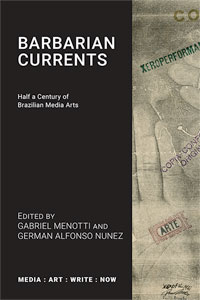The Commons vs Creative Commons III: Some Problems, Distinctions and Alternatives - Including Signals, CC's Response to AI
 Monday, September 1, 2025 at 9:22AM
Monday, September 1, 2025 at 9:22AM This is the third part of an initial 5,000 word draft of a specially commissioned piece on the commons and Creative Commons. It’s for an open-access online glossary on the contemporary condition and near future that's being produced by the Chinese Academy of Art.
Contents:
I: Introduction * Conceptual Overview * Elinor Ostrom and the Tragedy of the Commons * Liberal Commons * Radical Left Commons * From Capitalism to Postcapitalism – and Back Again
II: The Undercommons * Latent Commons * Uncommons * The Unknown Common * Common Misunderstanding No.1: The Commons is Not Inherently Left-wing
III: Creative Commons * CC and AI * Common Misunderstanding No.2: Creative Commons is Not a Commons * The Commons and Creative Commons: Some Distinctions * Alternatives to Creative Commons
IV: Conclusion: Common Misunderstanding No.3: Commoner is Not an Identity * Common Misunderstanding No.4: There is Not One Commons
---
Creative Commons (https://creativecommons.org/)

Creative Commons has been widely praised for fostering a culture of sharing, remixing and reuse within the framework of copyright law, while still preserving certain rights for creators and content owners. To this end it offers several types of licenses, ranging from the most restrictive (Attribution-NonCommercial-NoDerivatives, or BY-NC-ND) to the least restrictive (Attribution, or CC-BY), as well as the CC0 public domain legal tool, which enables creators to waive their copyright entirely. These licenses and tools allow authors, artists and educators to share their work (and, importantly, to receive acknowledgment, recognition and respect for it), while granting others varying degrees of freedom over what they can and cannot do with it.
For all these contributions, Creative Commons has several notable limitations. It was founded and championed by liberals such as Lawrence Lessig (2004) and James Boyle (2008), whose goal was to reform IP law, not abolish or radically rethink it. CC was designed to make copyright more balanced and “reasonable” by providing a choice between what Lessig positions as either “property” or “anarchy” (Lessig 2004, 11, 13). With some rights and freedoms being controlled “but not all,” the idea was to ensure copyright does not stifle innovation, business or competition (10). And, without doubt, Creative Commons plays an important role in (digital) culture, with an estimated two and a half billion works now available under some form of CC-license. Yet these licenses and public domain tools remain firmly embedded within the existing structures of copyright regulation. Far from challenging intellectual property (IP) regimes – say, by the kind of illegal or semi-legal tactics adopted by shadow libraries such as Sci-Hub – Creative Commons offers a more flexible approach that protects creatives and users from some of copyright’s extremes, without disrupting its core underlying logic.
Another key limitation is that the decision to apply a CC license, and to select which specific one to use, continues to rest entirely with the “voluntary action” of the original copyright holder (Lessig 2004, 11). As such, Creative Commons may benefit both professional and amateur members of the creative class to which Lessig and Boyle belong – “the new Walt Disneys” (9): artists, academics, designers, film makers, software developers and so forth – whose entrepreneurial opportunities to “flourish” (13) and themselves “Disnify the culture” (10) in turn are otherwise constrained by corporate ownership and control of IP. But it does little to confront deeper, systemic problems around the commodification and marketisation of culture and knowledge.
CC and AI

Rather than helping to produce a common subject, the framework of Creative Commons also assumes an highly individualistic, humanist and liberal model of authorship – and, some argue, of use as well. One exception is the proposed CC Signals initiative that Creative Commons is, at the time of this writing, developing in response to the extraction of large volumes of data from across the public web to train consumer-facing generative AI. As Creative Commons notes, “large AI models are benefiting from the labor, money, and care that goes into creating and maintaining the commons” while also functioning to deplete these shared resources: for instance, by “reducing the need for people to visit the original sources of information” (Creative Commons 2025b, 11, 9). Each signal – described as a global tool designed to be both machine and human readable – enables the stewards of large collections of content and data to declare their preferences regarding how they should be “used for machine reuse,” and how the machines (and the companies behind them) should give back to the shared knowledge ecosystem (Creative Commons 2025a). The aim, grounded in CC’s conviction that “universal access to knowledge and culture is a human right,” is to encourage people to continue to contribute to that ecosystem of open knowledge in an era of exploitative LLM AI (2025b, 4). And to do so without forcing stewards to adopt the all-or-nothing position of either completely allowing or completely preventing such machine reuse, be it technologically or by expanding copyright to make it more restrictive of AI – precisely the kind of blunt binary choice Creative Commons was originally devised to avoid. CC is careful to emphasize that signals “is not about creating new property rights; it is more like defining manners for machines” and changing social norms that way through coordinated collective action (2025a; 2025b, 25). Yet this only serves to draw attention to another of the shortcomings of the existing Creative Commons licensing model (which is separate from CC signals): it fails to adequately account for collective and nonhuman contributions to creative production, rendering it incompatible with more ontologically radical and heterogenous approaches.
Common Misunderstanding No.2: Creative Commons is Not a Commons
Despite the impression given by its name – and despite its self-description as an “organization that empowers people to grow and sustain the thriving commons of shared knowledge and culture” as a means of benefiting humanity (Creative Commons 2025b, 3), not to forget its use by many proponents of the commons – Creative Commons does not, strictly speaking, function as a (creative) commons. A commons typically refers to a shared, non-proprietary resource or space that is collectively managed and governed, often without strict adherence to individual ownership models. By contrast, Creative Commons licenses grant rights to users on a case-by-case basis at the discretion of the individual copyright holders (or those designated content stewards acting in their stead such as companies).
The Commons and Creative Commons: Some Distinctions
Key differences between the commons and Creative Commons include:
- Shared access vs. ownership: The commons challenges notions of exclusive ownership, emphasising collective production, use and protection. Creative Commons recognises and prioritises the rights of the individual copyright holder, placing their control over the work before any consideration of potential users’ rights.
- Community management vs. individual choice: Commons governance involves social processes, negotiations, contracts and sometimes legal frameworks that establish, maintain and actively enforce community-based stewardship. Creative Commons provides a range of licenses and public domain tools for individual authors to select from according to what they consider to be most appropriate for them.
- Social relations vs. licensing framework: Commons involve community relationships, participation and reciprocity. Creative Commons licenses are legal instruments that do not inherently encourage such social dynamics, at least not in the same way, applying only when copyright applies, which is what gives them “bite” (Creative Commons 2025b, 22). (Creative Commons can however be considered part of the larger ecosystem of publicly shared knowledge that includes the likes of Wikipedia, open access, open data licenses and the Wayback Machine, the informal social contract of which is based on a certain degree of reciprocal trust and exchange – or was until advances in AI placed it at risk.)
- Capitalist and colonialist vs. Indigenous and collective: Creative Commons is ill-suited to forms of cultural production that do not align with Western modernist-liberal – some would insist capitalist and colonialist – conceptions of authorship and intellectual property. Many Indigenous populations create culture collectively, treating it precisely as common. This makes it difficult to designate a single copyright holder (or a representative entity able to act as one) as required to apply a Creative Commons license. As a result, CC is limited in its ability to protect Indigenous cultural expressions from appropriation and exploitation by global capital or otherwise avoid repeating the ongoing dynamics of settler colonialism.
Alternatives to Creative Commons
While they are less widely known – perhaps precisely because they present more of a challenge to the dominant intellectual property regime and Western modernist-liberal frameworks – there exists a range of alternatives to Creative Commons and its licenses that are better equipped to support the collective creation, stewardship and protection of the commons. These include:
- Anti-Capitalist Software License (https://anticapitalist.software/)
Oriented toward a post-capitalist future, the Anti-Capitalist Software License (ACSL) enables the sharing of software that supports individuals, collectives, worker-owned cooperatives and nonprofits. Use by entities that profit from exploitative labour practices is explicitly restricted, however. The ACSL draws a clear distinction between commerce and capitalism: commercial use of software is permitted, so long as the organisation concerned is not structured along capitalist lines. In this way the ACSL aims to give such non-capitalist actors a strategic “advantage so that they may survive under capitalism – and outlive it.”
- CopyFair License (https://wiki.p2pfoundation.net/CopyFair_License)
A license designed to allow sharing of resources within the commons while excluding extractive commercial use by private companies. Inspired by ideas of reciprocity and fairness, CopyFair permits use by communities, cooperatives, commons-based enterprises and nonprofit actors, but restricts access to corporations that do not give back to the commons in the required manner.
- Copyfarleft (https://wiki.p2pfoundation.net/Copyfarleft)
As its name suggests, this is a radical left-oriented adaptation of copyleft and the latter’s aim to provide the users of a work with the freedom to copy, share and modify it, and the authors of a work the right to impose restrictions on its use (i.e., that any modified versions are released under similar, reciprocal, terms). Copyfarleft is designed to build counter-power within the commons by ensuring workers own the means of production. A copyfarleft license makes it “possible for producers to share freely and to retain the value of their labour product … but impossible for owners of private property to make money” by exploiting wage labour or accessing the common stock. Commercial use is therefore allowed, but only for worker-owned commons, collectives and cooperatives.
- CC4r: Collective Conditions for Re-Use (https://constantvzw.org/site/Collective-Conditions-for-Re-Use-CC4r,3483.html?w=https://constantvzw.org/wefts/cc4r.en.html)/; CC2r: Collective Commitment to Reuse
A collective, decolonial and trans-feminist commitment to reuse – rather than a license or legal tool – that understands authorship as a collaborative cultural practice, not the outcome of isolated individual creativity. CC4r/CC2r recognises the social and historical context in which creative work emerges and affirms that, in some cases, limiting or refusing reuse may be necessary. Instead of attaching finished permissions at the point of release, it encourages ongoing responsibility, experimentation, evaluation, contestation and revision. (Hence the transition from CC4r to CC2r.)
- Peer Production License (PPL) (https://wiki.p2pfoundation.net/Peer_Production_License)
PPL aligns with the CopyFair approach, though its co-designer Dmytri Kleiner contends that it falls under the Copyfarleft category. It promotes commons-based production through a model grounded in reciprocity. Under the terms of the Peer Production License, only fellow commoners, cooperatives and nonprofit organisations are permitted to use and re-use the common stock – explicitly excluding extractive capitalist use that seeks to profit from the commons without offering something in return.
- Feminist Peer Production License (https://0xacab.org/labekka/f2f/-/blob/no-masters/license-f2f-en.md)
A feminist reworking of the Peer Production License, use for commercial purposes is restricted to cooperatives, non-profits, collectives and self-managed workers’ groups that operate according to feminist principles. Any profits or added value generated through the rights granted by the Feminist Peer Production License must be directed back into efforts aimed at challenging capitalism and dismantling patriarchy.
- Traditional Knowledge (TK) and Biocultural (BC) Labels (https://localcontexts.org/about/)
Developed through the Local Contexts project, these labels provide Indigenous peoples, cultural institutions and researchers with practical tools to embed cultural meaning, historical depth and community-defined authority into the presentation and management of cultural heritage materials. These labels are designed to strengthen Indigenous governance and support community-led decision-making around questions of ownership, access and the culturally appropriate use of both historical and contemporary cultural content, as well as future collections of Indigenous culture and data.
 Gary Hall | Comments Off |
Gary Hall | Comments Off | 











